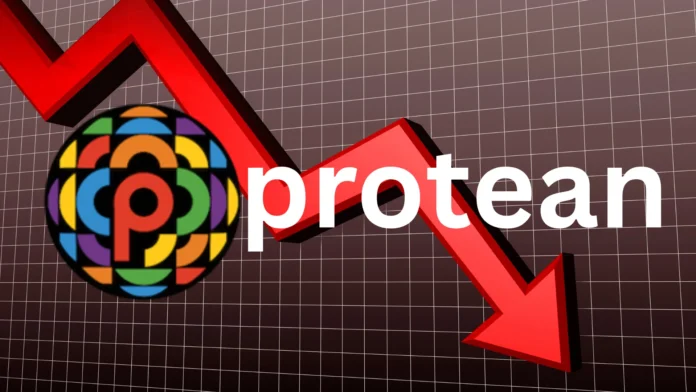Key Takeaways
- Protean eGov Shares Crash 20% after it failed to qualify for the government’s Rs 1,440 crore PAN 2.0 project, raising red flags over its future earnings.
- The PAN 2.0 contract is a large-scale digital revamp initiative critical to India’s tax infrastructure overhaul.
- Equirus downgraded Protean’s rating from “Add” to “Sell,” citing rising revenue risks.
- With PAN services accounting for nearly half of its revenue, Protean’s long-term financial outlook faces serious pressure.
- Investors are losing confidence as other business segments like ONDC retail services remain stagnant.
Introduction
In a sharp market reaction on May 19, shares of Protean eGov Technologies hit the 20% lower circuit after the company confirmed it had not progressed in the bidding process for the PAN 2.0 project, a landmark Rs 1,440 crore contract issued by the Income Tax Department. The news triggered widespread investor panic, highlighting Protean’s dependency on PAN-related revenue streams.
What is PAN 2.0—and Why It Matters
PAN 2.0 represents a next-generation overhaul of India’s Permanent Account Number (PAN) and TAN systems. The project involves comprehensive modernization, including design, development, and end-to-end management of India’s tax identity framework. For Protean, which has historically played a central role in PAN service delivery, winning this contract would have meant long-term stability and renewed relevance.
“This wasn’t just a contract—it was Protean’s chance to cement itself as the backbone of India’s tax-tech infrastructure for another decade,” noted a senior tax policy expert.
Why Protean’s Bid Was Rejected—and the Fallout
In a regulatory disclosure, Protean acknowledged that its bid to serve as the Managed Service Provider (MSP) for the PAN 2.0 project had been disqualified from advancing to the next evaluation phase. While the company attempted to calm investors by suggesting minimal near-term impact, the stock market wasn’t convinced.
The real concern? Nearly 50% of Protean’s current revenue is tied to PAN operations. The failure to secure PAN 2.0 risks eroding that stream over time.
Brokerage Equirus Slashes Rating, Warns of Future Declines
Equirus, a leading equity research firm, downgraded Protean’s stock from “Add” to “Sell” and revised the price target sharply downward from Rs 1,730 to Rs 900. The brokerage highlighted significant structural risks:
- PAN service revenue could decline by up to 100% within 2–3 years.
- The company may suffer a 35% revenue dip by FY27.
- Diminished free cash flow could choke future innovation and diversification efforts.
- Other verticals, such as ONDC retail initiatives, remain underdeveloped.
“Protean is staring at a looming cash crunch at a time when it needs to double down on transformation,” Equirus warned in its note.
Stock Performance: A Month of Decline
May 19’s 20% crash adds to a growing list of red flags:
- Down 15% in the last 5 trading sessions
- Down 22% over the past month
- Down 22% over the past 6 months
Long-term investors, previously reassured by the company’s position in the government tech ecosystem, are now reassessing its viability.
Strategic Reset Needed: Where Can Protean Pivot?
The PAN 2.0 setback has created an urgent need for Protean to diversify. Some promising directions include:
- Digitization of other government-led services such as healthcare, education, and land records
- Strengthening its weak ONDC (Open Network for Digital Commerce) offerings
- Exploring international e-governance markets, especially in nations adopting India’s digital ID blueprint
Unless it acts quickly, Protean risks falling behind in the increasingly competitive public-tech sector.
Investor Confidence on the Line
The failed PAN 2.0 bid has become a moment of reckoning. For investors, this wasn’t merely a lost contract—it was a strategic blunder that raises questions about leadership foresight and revenue sustainability.
“Protean has two options: evolve fast or fade out. It’s no longer just about recovery—it’s about reinvention,” said a Mumbai-based portfolio analyst.
Wider Market Lesson: The Risk of Overdependence
This episode underscores a broader market risk: overexposure to government contracts. While such deals offer prestige and short-term gains, they can turn into vulnerabilities if not paired with strong diversification and innovation.
Conclusion
Protean eGov’s 20% stock crash is a warning siren. The loss of the PAN 2.0 bid has not only impacted share price but has also thrown the company’s long-term strategy into question. As brokerage houses issue downgrades and investors pull back, Protean must urgently craft a bold, diversified roadmap to regain market trust—and relevance in India’s evolving digital ecosystem.


